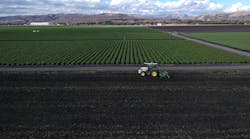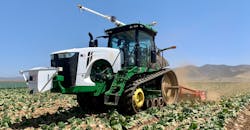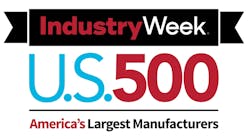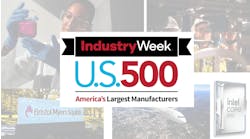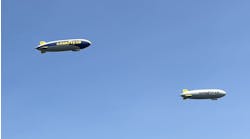John Deere's Acquisition of Bear Flag Puts Autonomy in Driver's Seat
When considering the future of farming, it is important to understand the problems facing the agriculture industry. One of the most pressing issues is something that also haunts manufacturing – the availability of skilled labor.
Unfortunately, when very narrow windows of opportunity exist to complete tasks, the challenge quickly become exponential, explains Dan Leibfried, director of automation and autonomy at Deere.
“In order to get the best outcome, it's not just a matter of taking more time to complete one job after the other. Whether it's preparing the soil, planting the seed, protecting or harvesting a crop, farmers have numerous activities occurring in parallel, and unfortunately labor is not always available,” Leibfried tells IndustryWeek. “If skilled labor is not available, it can have a significant impact on the overall outcome of a crop. We believe we can alleviate that problem by making equipment robotic and autonomous, and decoupling it labor availability.”
Aubrey Donnellan, co-founder & COO at Bear Flag Robotics, adds labor availability is a pain point growers have had for quite some time. “It's just exacerbating and getting worse. Growers also face so much variability in how they run their businesses. They're subject to fluctuating markets and unpredictable weather, impacting on the fly decisions about what to plant when," she says. "When we think about the farm of the future and what we can do for growers as business owners, we can up level them beyond solving this very painful problem around labor availability. We can up level them as business operators being able to be more productive and more strategic, using data to make better decisions, and basically scaling up and down their operations."
Investing in the future
Continually pursuing advances in the farm of the future was a driving force in Deere & Co.’s recent decision to acquire the Silicon Valled-based start-up Bear Flag Robotics for $250 million. Bear Flag develops autonomous driving technology compatible with existing machines. The deal accelerates the development and delivery of automation and autonomy on the farm and supports John Deere’s long-term strategy to create smarter machines with advanced technology to support individual customer needs.
“Deere views autonomy as an important step forward in enabling farmers to leverage their resources strategically to feed the world and create more sustainable and profitable operations,” said John Deere CTO Jahmy Hindman in a statement. “Bear Flag’s team of talented agriculture professionals, engineers and technologists have a proven ability to deliver advanced technology solutions to market. Joining that expertise and experience with Deere’s expertise in autonomy, along with our world-class dealer channel, will accelerate the delivery of solutions to farmers that address the immense challenge of feeding a growing world.”
Deere first started working with the Bear Flag team in 2019 as part of the company’s Startup Collaborator program, an initiative focused on enhancing work with startup companies whose technology could add value for Deere customers. Since then, Bear Flag has successfully deployed its autonomous solution on a limited number of U.S. farms.
“We're in the early stages, but we're starting to see both the technology convergence and the market pull in a significant way. Whether it's corn and soy crop conditions, specialty crops, growing lettuce, tomatoes, cotton or fruits in orchards and vineyards, the opportunities are wide and vast,” says Leibfried. “It's really about prioritizing those use cases and picking the right entry points to take this technology into grower's operations where they'll adopt.”
As Bear Flag built its autonomous platform, it intentionally narrowed its focus on tillage, but still has dreams of being in every production step. “The platform we built is not a bespoke tillage platform by any means,” says Donnellan. “It is a platform built to enable any production step a tractor is capable of doing, using any implement it is positioned to work with. And then capitalizing on all capabilities of those implements, which have a ton of built-in intelligence as well.”
One factor that will determine which applications to pursue next includes the readiness to automate the underlying implements within a closed loop system. “The more the system is closed loop controlled with high levels of accuracy and quality, the faster we can run towards autonomy,” says Leibfried. “Farmers don't desire to do an autonomous operation with mistakes all over the field. They want to do an autonomous operation yielding quality levels as if they were operating it themselves often with expectations to do it at even higher quality level.”
Currently, connectivity is the biggest challenge, often serving as a hinderance to driving autonomy in the certain geographies. “While it's getting better, we could still use significantly more reliable, high speed, low latency connections in rural areas,” say Leibfried. “As an industry, we continue to work closely with governments to close the digital divide. I think that's a macro factor outside of the technology we deploy, but it's an absolutely critical factor to accelerating our journey in this space.”
When building robotics, or even software that's driving hardware, it is crucial to take each use case as it is and define the success metrics, explains Donnellan. “As technologists, we have a perception of what would be valuable to people. But really working hand-in-hand with growers and understanding is crucial. What does it need to do functionally to please and delight a customer? It's important we cover all of these because there are so many use cases, and be thoughtful about which are priority, and how they connect to each other,” she says. “This isn't as big of a core existential challenge as connectivity, but it's at the forefront of our minds as innovators and engineers in making sure we're creating technology that is driving value today out in the field rather than providing a black box for technology's sake.”
All in perspective
Automation, robotics, big data utilization, autonomy, IIoT and other technology advances focused on agriculture are about far more than the technology companies like John Deere and Bear Flag are introducing. Instead, it is understanding and addressing the meaningful problems impacting the production of the world’s food supply.
“We all eat. We all need to ensure our food is not only grown in a high-quality manner, but in a sustainable way. Solving those problems is impactful to the world at large. I'm excited about what autonomy is going to do for John Deere and growers over time,” says Leibfried. “It's exciting time for entrepreneurs, and young technical minds out there who want to do something impactful for the world to come join the cause and be part of this exciting journey we're on.”
Parting words? “We're hiring,” says Donnellan. “We're trying to attract bright minds who are concerned and care about sustainability and feeding the growing world population.”
